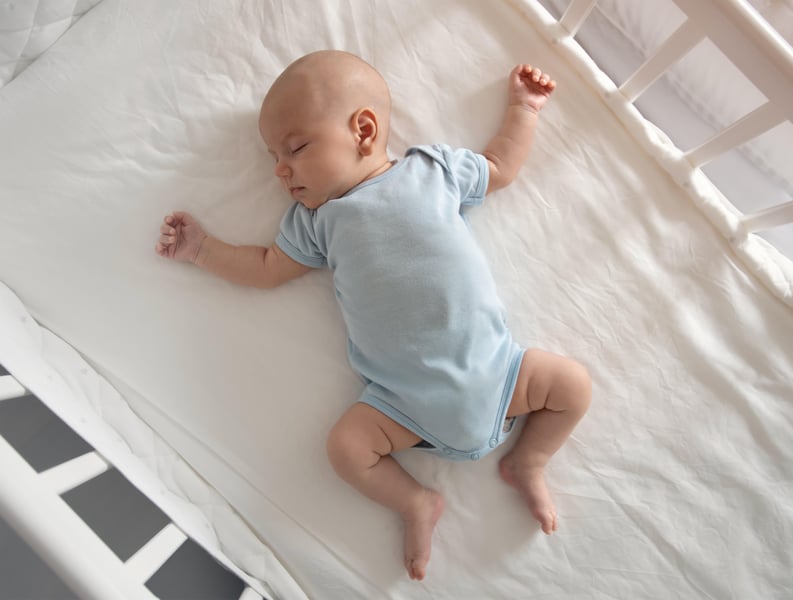Get Healthy!

- Steven Reinberg
- Posted June 21, 2022
Updated Infant Sleep Guidelines: No Inclined Products, Bed-Sharing
New infant sleep guidelines from the American Academy of Pediatrics (AAP) stress that parents make sure their infants sleep alone on their back on a flat surface and not in bed with mom or dad.
In addition, the recommendations urge mothers to breastfeed and not to rely on special baby monitors to prevent sudden infant death syndrome (SIDS).
"We've made great strides in learning what keeps infants safe during sleep, but much work still needs to be done," said report author Dr. Rachel Moon, a professor of pediatrics at the University of Virginia School of Medicine, in Charlottesville.
"A baby's death is tragic, heartbreaking and often preventable. If we've learned anything, it's that simple is best: babies should always sleep alone in a crib or bassinet, on their back, without soft toys, pillows, blankets or other bedding," Moon added in an AAP news release on the new guidelines.
The policy statement was published online June 21 in the journal Pediatrics.
A nonprofit that works to reduce SIDS cases welcomed the new guidelines.
"From our decades of work with care providers and families, we recognize the real-world challenges confronting parents as they care for their babies," First Candle CEO Alison Jacobson, who lost her son to SIDS in 1997, said in a statement. "We also realize the revised guidelines are appropriately drafted for members of the AAP and not necessarily written for families and caregivers. We support the guidelines and want to be sure that parents, caregivers and community members understand them as well as how to use infant products safely and as intended."
Some 3,500 infants die from sleep-related infant deaths each year in the United States, according to the AAP. These deaths can occur when an infant who is vulnerable to SIDS is placed in an unsafe sleep environment. The number of deaths has remained about the same since 2000, following a decline in deaths in the 1990s as a result of a national campaign to put babies on their backs to sleep.
Yet, racial and ethnic disparities persist, the AAP said. In fact, the rate of sudden unexpected infant deaths (SUIDs) among Black and American Indian/Alaska Native babies was more than double and almost triple, respectively, that of white infants (85 per 100,000 live births) between 2010 and 2013.
"It's essential for families and pediatricians to partner with each other, to build trust and have thoughtful conversations about how to keep children safe by lowering risks," said report co-author Dr. Rebecca Carlin, a pediatric hospitalist at NewYork-Presbyterian Hospital in New York City.
"We know that many parents choose to share a bed with a child, for instance, perhaps to help with breastfeeding or because of a cultural preference or a belief that it is safe. The evidence is clear that this significantly raises the risk of a baby's injury or death, however, and for that reason, AAP cannot support bed-sharing under any circumstances," Carlin said.
The risk of infant death is up to 67 times higher when sleeping with someone on a couch or soft armchair or cushion, and 10 times higher when sleeping with someone tired or using sleeping pills or alcohol or illegal drugs or who smokes, the researchers said.
Also, risks related to sleeping with someone else increase five to 10 times when a baby is less than 4 months old, the experts warn.
Jacobson pointed out that "parents are exhausted and while they may know the guidelines are against adult bed sharing, it happens, often for practicality while the mother is breastfeeding, and she may fall asleep. For others it's due to socioeconomic factors, cultural beliefs, traditions, or personal choice."
To reduce the risk of sleep-related infant death, the AAP recommends:
- The baby should sleep on a firm, flat surface that adheres to the federal rules governing cribs, bassinets, play yards and bedside sleepers.
- Devices such as car seats, strollers, swings, infant carriers and infant slings should not be used as routine places to sleep, particularly for infants younger than 4 months.
- Breastfeeding reduces the risk of sleep-related infant deaths.
- Avoid infant exposure to nicotine, alcohol, marijuana, opioids and illicit drugs.
- Make sure the baby gets routine immunizations.
- Using a pacifier is associated with reducing risk.
- Don't use commercial devices touted to reduce the risk of SIDS - there is no evidence that they work.
- Awake tummy time is recommended to promote infant development and minimize flat head syndrome.
- There is no evidence that swaddling reduces the risk of SIDS.
"Parents might think that their infant is waking up too much during the night and fear that something is wrong," Moon said. "But babies, by their nature, wake up frequently during the night. Although this can be understandably frustrating for parents who are exhausted and losing out on their own sleep, babies have to wake to feed every 2 to 3 hours, so this is normal and healthy, and should be expected. When parents have questions about their infant's sleep, they should always ask their pediatrician for guidance."
More information
For more on preventing SIDS, head to the American Academy of Pediatrics.
SOURCES: American Academy of Pediatrics, news release, June 21, 2022; First Candle, statement, June 21, 2022


